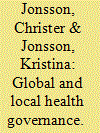|
|
|
Sort Order |
|
|
|
Items / Page
|
|
|
|
|
|
|
| Srl | Item |
| 1 |
ID:
116873


|
|
|
|
|
| Publication |
2012.
|
| Summary/Abstract |
Relative social and economic well-being in the aftermath of a state's collapse is usually explained on the basis of a single case, Somalia, and with reference to the impact of endogenous factors such as the repressive and predatory nature of the state which collapsed and the ability of civil society actors and institutions to fulfil those functions that are normally performed by a state. This article challenges this theoretical view. As can be seen from a study of Lebanon, relative well-being after state collapse is more common than it appears to be at first glance. Moreover, given the limited role that the Lebanese state played in the economic and political spheres before the breakdown of state authority in 1975, the repressive and predatory nature of the collapsed state cannot be the explanatory variable in this case. Exogenous factors, such as remittances from abroad, international loans bestowed upon residual state institutions and 'political money' from foreign powers, are the decisive factors generating such paradoxical developments. Study of Somalia and Lebanon also shows the limitations of the conceptualisations of state collapse prevalent in the literature.
|
|
|
|
|
|
|
|
|
|
|
|
|
|
|
|
| 2 |
ID:
116852


|
|
|
|
|
| Publication |
2012.
|
| Summary/Abstract |
From the outset in the mid-1980s the international response to hiv/aids has been characterised by an emphasis on the human rights aspects of the pandemic, and on recognition of the pivotal role of civil society actors (csos). But how the rights-based conception of hiv/aids and the international legitimation of csos play out at the local level depends not only on the vertical coordination between global and local levels but also on government-cso relations and the understanding of the pandemic in individual countries. South Africa and Cambodia provide comparative examples of 'glocalised' responses to hiv/aids. Both countries were among the hardest hit in their respective regions. But, while the South African government was slow to acknowledge the severity of epidemic, the Cambodian leadership quickly initiated a comprehensive response to it. The two cases illustrate how opportunity structures at the international and national levels created different local responses to hiv/aids, with significant consequences for the epidemic over time.
|
|
|
|
|
|
|
|
|
|
|
|
|
|
|
|
| 3 |
ID:
153407


|
|
|
|
|
| Summary/Abstract |
Based on a unique survey of non-governmental organization (NGO) practitioners from diverse backgrounds, the article examines how these NGO practitioners view their peers and people alike, and the interconnectedness, unity and solidarity of the NGO sector. The research has found that mutual awareness and trust is strong at the interpersonal level among NGO practitioners, yet their views on the collective existence of an NGO and activism community remain divided. In addition, preliminary statistical analysis shows that particular work experiences such as connections with other NGOs and participation in policy advocacy are associated with the optimism of a shared community of social activism. More importantly, the more one has—or feels one has—having peers across organizations, the more favorably one thinks of the whole activism community. Therefore, the key to ‘becoming a community’ for civil society in China lies in ‘having peers’ for individual activists and NGO practitioners.
|
|
|
|
|
|
|
|
|
|
|
|
|
|
|
|
| 4 |
ID:
159199


|
|
|
|
|
| Summary/Abstract |
HOW “PUBLIC” IS PUBLIC INTERNATIONAL LAW? DESPITE ITS NATURAL LAW
origins, international law has long privileged the role of the state. Today,
NGOs and civil society actors play an increasingly important role—offering
a voice for the disenfranchised through their advocacy and a helping hand for
the disadvantaged through their operations. Calls for accountability from
these actors are understandable, but often founder on their diversity. This
essay develops a typology of such actors, based on their activities and their
drivers, to distinguish justifications for and potential mechanisms of accountability.
In addition, it suggests a possible evolution in the international order
where the status of an actor (state, intergovernmental organization, NGO,
etc.) is less important than its function
|
|
|
|
|
|
|
|
|
|
|
|
|
|
|
|
|
|
|
|
|